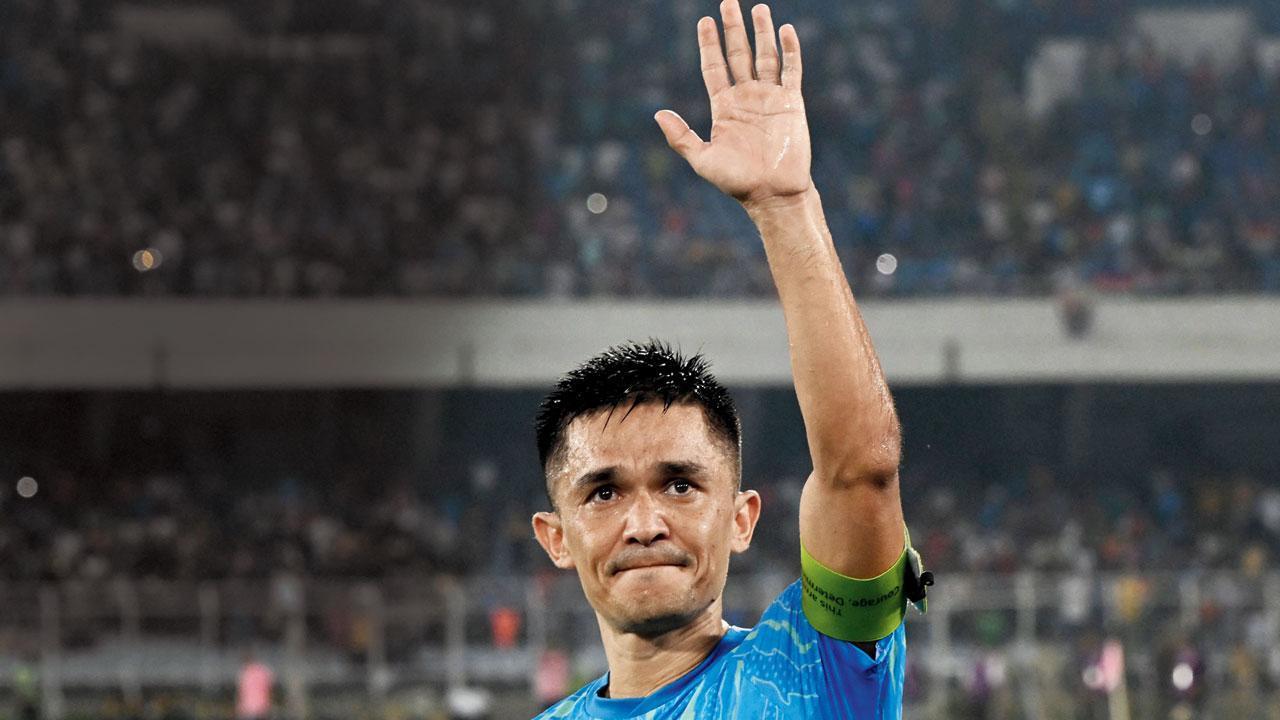
In a historic yet bittersweet evening at the Salt Lake Stadium in Kolkata, India’s illustrious football captain Sunil Chhetri stepped onto the international stage for the very last time. The FIFA World Cup qualifier against Kuwait ended in a goalless draw, casting a somber tone over what was supposed to be a grand farewell for the country’s football icon.
As Chhetri waved to the 68,000-strong crowd filled with passionate fans, the reality set in that this was the end of his remarkable 19-year career in international football. The mood in the stadium was palpably somber despite being packed, an eerie juxtaposition as the crowd grasped the final act of Chhetri’s storied journey.
While the match against Kuwait offered moments of hope and enthusiasm, the team faltered in capitalizing on their chances. India’s inability to clinch a win in this crucial World Cup qualifier has left the team in a challenging position for advancing to the third round of qualifiers. With five points on the table, India now faces a tough contest against Asian champions Qatar in their final match on June 11. Kuwait, with four points, will take on Afghanistan on the same day.
Sunil Chhetri, 39, concludes his magnificent international career as one of the most prolific goalscorers in the history of football. His tally of 94 goals places him fourth in the all-time rankings, trailing behind names like Portugal’s Cristiano Ronaldo (128), Iran’s Ali Daei (108), and Argentina’s Lionel Messi (106).
In a country that has long yearned for significant footballing achievements, Chhetri’s career has been nothing short of monumental. His prowess and consistency have earned him a legendary status, acknowledged globally by FIFA when he announced his retirement on May 16. The event at the Salt Lake Stadium was a heartfelt adieu, attended by his proud parents Kharga and Sushila, his wife Sonam Bhattacharya, and a host of dignitaries and ex-players.
Though the stadium was nearly at full capacity, there was a distinct sense of emptiness. The void left by Chhetri’s departure hung in the air, highlighted by fans wearing the iconic No.
. 11 jersey he sported for nearly two decades. On this conspicuous night, the Blue Tigers fought valiantly against Kuwait but missed several scoring opportunities that could have altered the outcome.
Chhetri, the team’s captain, was the first to alight from the team bus, greeted by an appreciative throng of supporters who braved adverse weather to witness his final international game. Their unwavering support and loud cheers illustrated the deep bond between Chhetri and the fans, making his farewell even more poignant.
The significance of Sunil Chhetri’s contribution to Indian football cannot be overstated. Over his tenure, he has transformed the sport’s landscape in India, inspiring a generation of young athletes and elevating the nation’s status on the global footballing map. His retirement marks the end of an era, a monumental shift for Indian football, and leaves an undeniably large gap still searching for a worthy successor.
As the match drew to a close, the emotional farewell was not just a goodbye to a player but to an epoch in Indian football. The draw against Kuwait might not have been the result fans hoped for, but the spectacle of Chhetri’s final bow eclipsed the disappointment.
Moving forward, India’s focus shifts to their crucial encounter with Qatar. The team’s performance in that match will be decisive for their aspirations of advancing in the qualifiers. Meanwhile, Kuwait faces Afghanistan, and both matches will determine the direction each team heads in the World Cup campaign.
This chapter of Indian football, adorned with the brilliance of Sunil Chhetri, may have concluded. However, his legacy will continue to inspire, drive, and push boundaries within the sport in India for years to come. The echoes of a standing ovation from a sea of blue jerseys at the Salt Lake Stadium will forever remain a testament to his exceptional career and the indelible impact he has had on the beautiful game.










